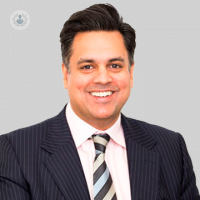Why is bowel cancer awareness so important?
Written by:Bowel cancer, also known as colorectal cancer, is one of the most common types of cancer worldwide. It occurs in the colon or rectum, which are parts of the digestive system responsible for processing food, absorbing nutrients, and eliminating waste.
While bowel cancer can affect people of all ages, it is more commonly diagnosed in individuals over the age of 50. Read our latest article here to find out why increasing awareness of this common cancer is so pivotal. Here, esteemed bowel cancer screening endoscopist, Mr Pasha Nisar, provides us with an insightful guide into the importance of bowel cancer screening.

Why is bowel cancer awareness so important?
Bowel cancer awareness is crucial for early detection and treatment, as the disease is highly treatable when caught in its early stages. Unfortunately, many cases of bowel cancer are not detected until the disease has progressed, making treatment more challenging and reducing the likelihood of a successful outcome.
One of the key messages of bowel cancer awareness is the importance of screening for the disease. Screening tests, such as stool tests, colonoscopies, and sigmoidoscopies, can help detect bowel cancer or precancerous polyps before symptoms develop.
These tests are recommended for individuals at average risk of bowel cancer starting at age 50, although people with certain risk factors, such as a family history of bowel cancer or inflammatory bowel disease, may need to start screening earlier or undergo more frequent testing.
In addition to screening, bowel cancer awareness campaigns emphasise the importance of recognising the signs and symptoms of the disease. Common symptoms of bowel cancer may include changes in bowel habits (such as diarrhoea or constipation), blood in the stool, abdominal pain or discomfort, unexplained weight loss, fatigue, and a feeling of incomplete emptying after a bowel movement. Anyone experiencing these symptoms should promptly consult their healthcare provider for further evaluation and testing.
Educating the public about modifiable risk factors for bowel cancer is another important aspect of bowel cancer awareness. While some risk factors, such as age and family history, cannot be changed, there are several lifestyle factors that can be modified to reduce the risk of developing bowel cancer. These include maintaining a healthy weight, being physically active, eating a balanced diet rich in fruits, vegetables, and whole grains, limiting red and processed meat consumption, avoiding excessive alcohol consumption, and not smoking.
To consult with Mr Pasha Nisar, simply visit his Top Doctors profile today.


